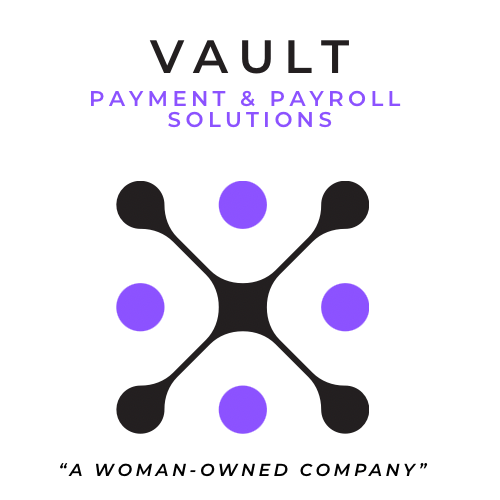As businesses increasingly rely on electronic transactions, Automated Clearing House (ACH) payments have become a popular choice for their efficiency and cost-effectiveness. However, the rise in digital payments also brings heightened risks of fraud. Understanding these threats and implementing robust security, means protecting your business.
We’ll dive into the common fraud risks associated with ACH payments, outline best practices for enhancing payment security, and explore how Vault Payment Solutions can help safeguard your financial assets.
If you haven’t already, check out our first blog on the advantages of ACH payments and our second blog on how to leverage ACH for cost savings.
Understanding ACH Payment Fraud Risks
While ACH payments offer convenience and lower costs, they are not immune to security threats. Below are the most common types of fraud that Maryland businesses should be aware of:
1. Unauthorized Transactions
“Fraudsters” often use stolen account information to initiate unauthorized ACH payments. This is typically achieved through:
-
- Phishing scams: Deceptive emails trick employees and business owners into revealing sensitive details.
-
- Malware attacks: Malicious software infiltrates systems to harvest financial data from businesses.
-
- Data breaches: Cyberattacks expose customer and company information, creating vulnerabilities for fraudulent activities that could derail business operations and revenue generation.
2. Business Email Compromise (BEC)
Business Email Compromise (BEC) is a sophisticated scam where attackers impersonate trusted parties (such as company executives or vendors) to authorize fraudulent payments. These scams rely on creating a false sense of urgency.
The Federal Bureau of Investigation (FBI) reports that in 2023, BEC scams cost businesses billions of dollars. While these attacks are more prevalent in industries like real estate, every business is at risk.
3. Data Breaches
Data breaches expose sensitive information, putting both businesses and their customers at risk. According to the Ponemon Institute’s 2024 report, the average cost of a data breach has risen to a record high of $4.45 million, increasing the importance of data protection for Maryland business owners.
Best Practices for ACH Payment Security
To minimize risks, businesses should adopt proactive measures to secure ACH payment processing transactions. Below are the most effective practices:
1. Employee Education and Awareness
Employees play a pivotal role in maintaining payment security for businesses.
-
- Ongoing Training: Regularly educate employees about phishing, social engineering tactics, and data security protocols.
-
- Strong Password Policies: Require complex passwords and implement periodic updates. Make sure to not use the same password for every portal, website, or account.
-
- Role-Based Access: Limit access to financial data based on job responsibilities-if they don’t have a “need to know,” they do not need access to the data.
2. ACH Authentication and Verification
Adding layers of verification helps prevent unauthorized transactions in your business.
-
- Two-Factor Authentication (2FA): Require additional steps, such as a one-time code sent to a mobile device, to approve payment processing.
-
- Vendor Verification: Use strict procedures to validate new vendors and periodically update existing vendor information.
-
- ACH Positive Pay: Match each financial transaction against a list of approved payments to block unauthorized transfers.
3. Monitoring and Detection
Early detection can prevent fraudulent activity from escalating and harming business operations.
-
- Fraud Detection Tools: Invest in trusted payment processing software to identify suspicious patterns.
-
- Regular Account Monitoring: Frequently review financial transaction activity for unusual activity.
-
- Incident Response Plan: Prepare a comprehensive plan for addressing security breaches. Do your employees know what to do if they see suspicious activity?
The Role of Financial Institutions
Not only does your payment processing software play a role in your business’ financial and operational security, and ability to deliver your service or products to customers, banks and credit unions also play a large role in protecting businesses from ACH fraud. They support businesses by:
-
- Fraud Detection Systems: Using advanced technologies to flag suspicious activity.
-
- Customer Protection Programs: Offering reimbursement for fraudulent transactions.
-
- Educational Resources: Providing businesses with tools and tips for enhancing payment security.
Vault Payment Solutions: Your Partner in ACH Security
Local Maryland businesses face a lot of challenges in securing their financial transactions and ensuring seamless and secure payment processing experiences for their customers and clients. That’s why Vault Payment Solutions prioritizes offering secure ACH payment solutions for our clients and businesses all throughout Maryland. .
Here’s how Vault Payment Solutions helps Local Maryland Businesses:
-
- Operations Assessments: Vault Payment Solutions takes an operations-first approach in identifying vulnerabilities and opportunities for improved payment processing experiences for your customers and your company.
-
- Risk Assessments:Vault Payment Solutions evaluates your business’ current payment processing vendor security measures and identifies any vulnerabilities in the software or relevant to your industry, to mitigate or remove entirely.
-
- Tailored Solutions: We recommend the best payment processing and POS systems to suit your business needs, all while reducing risk and improving customer experience.
-
- Ongoing Support: At Vault Payment Solutions, we partner with you to implement best practices and respond to evolving threats. We are with you every step of the way. We are locally owned and operated, and on call for you!
ACH Payment Processing – The Bottom Line
Safeguarding ACH payments isn’t just about avoiding fraud; it’s about securing your business’ future. By taking proactive steps to enhance payment security and partnering with trusted providers like Vault Payment Solutions, Maryland businesses can:
-
- Minimize risks of fraud to the company.
-
- Protect sensitive financial assets.
-
- Save money to facilitate business growth.
-
- Ensure a seamless payment transaction experience for customers
Together, we can help your business thrive by maintaining secure and affordable payment processing, reducing vulnerability to disruptions in business operations, and staying up to date with easy payment processing solutions that keep your customers and clients happy! with confidence!
Ready to take the next step? Visit our Credit Card Processing page to explore secure ACH payment solutions and contact us for a personalized consultation.

